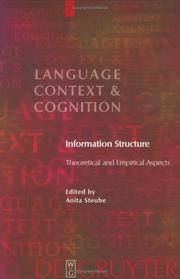| Listing 1 - 2 of 2 |
Sort by
|


ISBN: 3110905892 9783110905892 9783110179347 3110179342 Year: 2013 Volume: v. 1 Publisher: Berlin Boston
Abstract | Keywords | Export | Availability | Bookmark
 Loading...
Loading...Choose an application
- Reference Manager
- EndNote
- RefWorks (Direct export to RefWorks)
Der Band behandelt die Schnittstelle zwischen Pragmatik, Grammatik und Psycholinguistik bzw. Neurolinguistik. Pragmatisch bedingt sind die Zurechnungen von Satzteilen zur bekannten oder zur Neuinformation im Text. Realisiert werden die pragmatischen Gliederungen aber in der Grammatik. Die theoretische Modellierung erfolgte in generativen Grammatiken, in optimalitätstheoretischen Modellen oder anhand der Alternativsemantik.Der Schwerpunkt der Untersuchung liegt auf Korrekturkonstruktionen und auf Hutkonturen. Erstere zeichnen sich durch Kontrastakzente aus und Letztere sind zweigipflig akzentuiert. Um die Prosodie weiterzuentwickeln, beschäftigt sich die Hälfte der Beiträge mit dem psycholinguistischen und neurophysiologischen Nachweis der Intonationsparameter und mit ihrer Auswertung im Kontext.Von der Kontrastintonation geht der Band dann über zur Typologie von Kontrastkonstruktionen, zu ihrem grammatischen Vergleich und ihrer textuellen Verwendung.
Contrastive linguistics. --- Focus (Linguistics) --- Grammar, Comparative and general --- Intonation (Phonetics) --- Semantics. --- Formal semantics --- Semasiology --- Semiology (Semantics) --- Comparative linguistics --- Information theory --- Language and languages --- Lexicology --- Meaning (Psychology) --- Linguistics --- Pitch (Phonetics) --- Phonetics --- Prosodic analysis (Linguistics) --- Tone (Phonetics) --- Oral interpretation --- Functional sentence perspective (Grammar) --- Predicate and subject (Grammar) --- Subject and predicate (Grammar) --- Theme and rheme --- Topic and comment (Grammar) --- Discourse analysis --- Topic and comment. --- Intonation --- Subject and predicate --- Syntax --- Topic and comment --- Contrastive linguistics --- Semantics --- 801.56 --- 801.56 Syntaxis. Semantiek --- Syntaxis. Semantiek --- Focus (Linguistics). --- Intonation (Phonetics). --- Philology
Book

ISBN: 3110515857 3110517876 9783110517873 9783110517880 3110517884 9783110515824 3110515822 9783110515855 9783110515855 Year: 2017 Publisher: Berlin Boston
Abstract | Keywords | Export | Availability | Bookmark
 Loading...
Loading...Choose an application
- Reference Manager
- EndNote
- RefWorks (Direct export to RefWorks)
The present volume offers a selection of papers on current issues in Slavic languages. It takes stock of the past 20 years of linguistic research at the Department of Slavic Studies at Leipzig University. Within these two decades, the scientific writing, teaching, and organization done in this Department strengthened the mode of research in formal description of Slavic languages, formed another center for this kind of linguistic research in the world, and brought about a remarkable amount of scientific output. The authors of this volume are former or present members of the Department of Slavic studies or academic friends. Based on the data from East, West, and South Slavic languages, the papers tackle issues of all grammatical subdisciplines in current models of description, compare parts of the grammars of Slavic languages, explain categories and phrases in Slavic languages that do not exist in present-day Indogermanic languages of Western Europe, and propose ways how to update the standard of lexicography in still less described Slavic languages. A study of language competence is dedicated to the actual requests on heritage speakers and shows how their abilities can be evaluated. The present volume offers a selection of papers on current issues in Slavic languages. It takes stock of the past 20 years of linguistic research at the Department of Slavic Studies at Leipzig University. Within these two decades, the scientific writing, teaching, and organization done in this Department strengthened the mode of research in formal description of Slavic languages, formed another center for this kind of linguistic research in the world, and brought about a remarkable amount of scientific output. The authors of this volume are former or present members of the Department of Slavic studies or academic friends. Based on the data from East, West, and South Slavic languages, the papers tackle issues of all grammatical subdisciplines in current models of description, compare parts of the grammars of Slavic languages, explain categories and phrases in Slavic languages that do not exist in present-day Indogermanic languages of Western Europe, and propose ways how to update the standard of lexicography in still less described Slavic languages. A study of language competence is dedicated to the actual requests on heritage speakers and shows how their abilities can be evaluated.
Linguistics. --- Linguistic science --- Science of language --- Language and languages --- Grammar. --- Slavic Studies.
| Listing 1 - 2 of 2 |
Sort by
|

 Search
Search Feedback
Feedback About UniCat
About UniCat  Help
Help News
News